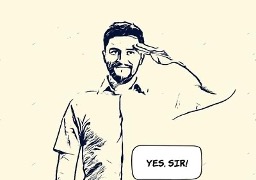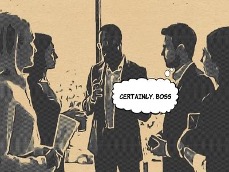You might have used this expression, “ayé aye, captain” jokingly with your friends when they ask you to do something. However, do you know the true meaning of this phrase, or you’re just saying what others say?
Do you also know other expressions can mean the same thing too?
“Aye aye captain” is an old-fashioned expression, and in this article, I’ll be discussing 15 phrases like ayé aye captain. First, however, you’ll know the meaning of this phrase.
Meaning of “Ayé Aye Captain”
Ayé aye captain is a phrase people use when responding to a command they intend to obey. This old-fashioned expression can also be used sarcastically or playfully with friends or when you don’t intend to do as ordered.
“Ayé aye, captain” simply translates to, “yes, yes, captain.” It has been used by the military or sailors in response to an order from the captain or someone of authority.
These days, people use it informally in response to an order or request from someone. Also, you can use this phrase sarcastically when you intend to make a jest at the person making the request.
15 Phrases Similar to “Ayé Aye Captain”
There are countless expressions like ayé aye, captain. Any expression that indicates affirmation of a request or order, can replace this phrase.
Some of the phrases similar to “aye aye captain” include: “alright, sir,” “copy that,” “okay, boss” and many more. That being said, here are 15 expressions like, “ayé aye, captain.
- Yes, sir
- Alright, sir
- Understood, sir
- Okay, boss
- Copy that
- I hear you
- Roger that
- Acknowledged, sir
- No worries
- Grab that
- I read you loud and clear
- Very well
- Okey dokey
- Certainly, boss
- Sure, Sir
Yes, Sir

As earlier established, “aye” simply means “yes.” “Yes” is the modern and formal word for “aye.” So, this phrase means the same thing as, “ayé aye, captain.”
“Yes” is a word that shows your approval and understanding of a statement. It shows consent. If you’re having a conversation with someone, you can say “yes” to show your understanding or that you’re following.
So, “Yes, sir” is a formal expression you use with someone of authority in response to a request they make or an order they give.
If you accept to grant the request or attend to the order, you use this expression to assent to it.
It’s very appropriate in the workplace or a formal setting. In addition, you can also use this informally and playfully with your friends when they give you an order.
Alright, Sir
“Alright, sir” is another expression like “ayé aye, captain.” It’s a phrase you also use to confirm what you’ve heard or to show your understanding of what you’ve heard.
Also, when responding to an order, you can use this expression when you assent to the command. It’s a formal expression, but you can always use it informally.
Understood, Sir
“Understood, sir” also works like the above phrases to express your understanding of a subject matter. It’s a direct way of saying you get the message being passed to you.
Also, if you intend to carry out the message, this phrase confirms it. This is a formal way of responding to your bosses or someone older or in higher authority. But, you can as well use it jokingly or playfully with friends.
Okay, Boss
“Okay” is a word you use to show approval and satisfaction and to express understanding. Also, you can use this word to show that you’re in good health.
For instance, when someone asks how you are fairing, you can say, “okay” to let them know you’re fine.
However, in this case, just like, “ayé aye, captain,” when you say, “okay, boss” to a request or order, it confirms your intention to carry out the task.
“Boss” here doesn’t necessarily mean your employee. You can use this term with someone of higher authority, with a stranger, or even with your friends when you consent to their request.
In addition, you can be sarcastic with this expression, especially with your bossy friends.
Copy That
“Copy that” is an expression that says, “I heard and comprehended the message.” This is a widely used expression in the force when communicating via radio transmission to confirm the receipt of the transmission.

However, it isn’t an official military or force term. So, this phrase also works like “ayé aye, captain” to express your understanding of what’s being said to you.
It’s an informal expression, so you should limit its use to an informal or semi-formal setting. However, depending on your relationship with your boss, you can use this expression with them to express your understanding.
I Hear You
“I hear you” is another phrase like, “aye aye, captain.” It’s an informal way of saying you’ve gotten the message that’s being passed to you.
Also, this is a funny way of letting someone know that you understand what they’re telling you, especially for someone repeating the instructions.
You can use the expression to get them to stop by saying something like, “I hear you, can we change the topic now, please?”
In addition, you can use this expression sarcastically with someone you don’t intend to follow their order.
Roger That
“Roger that” means the same thing as “copy that.” It’s another phrase like, “ayé aye, captain,” that you can use to let someone know you’ve gotten the information they passed.
This is a common expression with the military or people in the force, just like “copy that.” It’s a form of communication that tells your colleague or superior that you’ve received the signal sent or you’ve gotten their message clearly.
In addition, it’s an informal expression to use with friends and colleagues. However, with your superior, it’ll depend on the relationship you share.
Acknowledged, Sir
“Acknowledged” is an expression that simply means, “accepted.” When your boss passes information to you or gives an assignment, using this expression lets him know you understand the message.
Also, it tells him that you intend to carry out the instructions. It’s a phrase that’d work in a formal or professional setting. However, you can always use it with friends.
So, it’s a cool expression that you can use instead of “ayé aye, captain.”
No Worries
This is another way of expressing your understanding of a message. It works like “ayé aye, captain” to let the person giving the command know that you’ll carry it out.
When someone asks you to do something for them and you say “no worries,” this phrase can also let them know it’s something you can handle.
While it makes sense to say it expresses your understanding of instruction, you can also use this phrase to assure the person of your capability. Also, you can use the expression to reassure someone worried.
Grab That
“Grab that” also works like “ayé aye, captain” to let someone know that you understand what they tell you.
It’s an expression you can use in an informal environment. When someone asks you to do something for them, this expression doesn’t only show your understanding, it shows your readiness to do it.
For instance:
A- can you pick Damian up from school on your way from the mall?
B- Grab that. When does he close?
I Read You Loud and Clear
This is another expression like “ayé aye, captain.” It’s an idiomatic expression that is used in the force or places where they communicate via radio or telephone.
This phrase will let the person at the other end know you can hear and understand them clearly.
Also, it’s an expression you can use in a work or casual environment to communicate your comprehension of the message passed to you.
Very Well
“Very well” is another straightforward statement that tells your understanding of a message.
It’s a versatile expression that can work in both a formal or informal environment to let the other person know you intend to do as they say.
You can use this expression with friends’ or colleagues’ names or with an endearment. For someone of higher authority, you can add “sir” as appropriate.
Okey dokey
“Okey dokey” is another phrase you can use instead of “ayé aye, captain.” This expression is the variant for “okay,” originating far back in the 20th century.
When you use this phrase, it tells the person that you understand their message, or you intend to carry out an instruction given to you. It’s a slang word that shouldn’t make its way to a professional or work environment.
Certainly, boss
This is a cool way of expressing your understanding and assent to an instruction.
When someone asks you to do something, and you use this phrase, it assures them you’ll carry out the assignment given.
“Certainly” gives an assurance that you clearly understood the task given to you or the message passed.
For example:
A- Can you get this done by midnight?”
B- certainly, boss.
So, this expression gives your 100% guarantee to the person that you’ll carry out the task given.

Sure, Sir
“Sure, sir” is another expression to use when someone gives you a command.
It’s mostly used with people in authority to assent to the instruction they give to you.
However, you can use this expression playfully to tease your bossy friend. Also, you can use it sarcastically with someone you don’t intend to listen to.
End Note
So, there are different phrases like “ayé aye, captain” you can use to express an understanding of a message given to you.
And also to affirm that you’ll carry out the instruction. These above examples are expressions you can use in a formal and informal environment.
So, you should choose the phrase that fits your setting and you can always add yours.